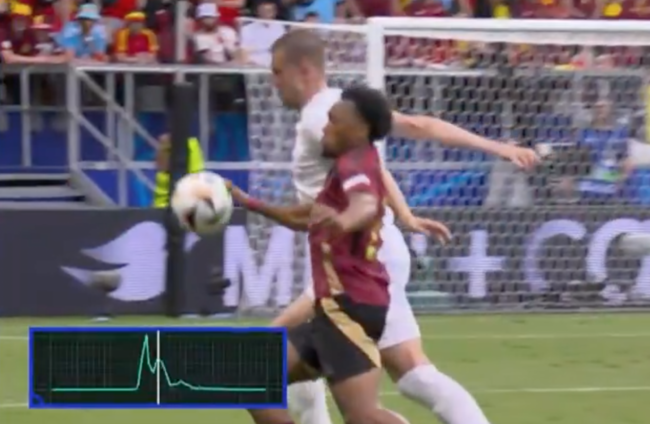WHAT HAVE WE learned about the future of the game on the back of the first round of group fixtures in Euro 2024?
Well, we’re either entering a truly dystopian age or about to embark on a new era of transparency.
It all depends on your trust issues.
Never mind the breakout stars, tactical trends or masterful managers. The single most impactful revelation from the last week in Germany has been the microchips placed inside the footballs.
Belgium, or Romelu Lukaku to be precise, had two goals disallowed against Slovakia because of the technology, which isn’t quite brand new given it was used at the 2022 World Cup specifically for offsides.
Its scope has broadened since, and Belgium felt the full effects on Monday.
The Big Brotherfication of football continues apace.
Lukaku’s first goal, prodding home Amadou Onana’s knockdown in the six-yard box, was ruled out as he had strayed millimetres beyond the last man when the midfielder connected with the header.
We know this because the microchip inside the new Adidas ball can detect up to 500 movements per second and, as a result, could determine the exact moment contact was made by Onana.
(Incidentally, Manchester United’s Antony may prove somewhat of a bug for the new technology when it inevitably reaches the Premier League given the Brazilian usually makes 501 movements before making a decision in possession.)
Allied with the use of semi-automated technology, which utilises a plethora of camera footage and tracking software, the decision could be made almost instantly to disallow Lukaku’s goal.
Adidas confirmed that the microchip “sends precise ball data to video officials in real time” in order to speed up the process and that the chip is also rechargeable.
So kudos for making sure it still had enough juice to rule out Lukaku’s second goal of the game four minutes from the end of normal time.
This incident showed the technology working in its starkest form – at least for now. The chip, you see, doesn’t work alone. It operates “in conjunction with limb-tracking technology to help determine whether there has been a handball in the lead-up to a goal”.
The TV viewer saw the wavelength graphic in the corner of the screen flicker as Lois Openda and Slovakian defender Denis Vavro tussled for possession 40 yards from goal.
That flicker, at the point at which Openda grazed the ball, is what led to the Belgian being penalised for the slightest of touches.
While a similar system has been operating in cricket to determine if a batter has connected with a ball, again this felt like an overreach of its capabilities in football; an extreme justification for its place in a game that operates completely differently to a rival sport.
But in an age of misinformation and deep fakes, when an understanding of complex geopolitics is required to try and grasp the ownership of some clubs, not to mention a growing distrust of officials and rule makers (Nottingham Forest showed themselves up for this in England last season), how long before these technologies give rise to protests and are the basis for accusatory statements decrying supposed ulterior motives?
Overcoached footballers are already accused of being robots, so how long before they take things one step further?
If these microchips can be placed inside balls, is it really so farfetched to think it won’t be long before they become part of boots (or it’s suggested they are implanted in players) to help determine the true extent of contact in the box or other key decisions that need to be made.
Given how often we now hear talk of “meeting the threshold” of what is and isn’t acceptable when it comes to tackling, that’s another area in which it will surely benefit.
Belgium’s pain was only one moment but these Euros have already given us a glimpse of the dystopian age of football and the rise of the microchips.
















Should do away with offside in football. Let the players decide the result not AI.
@Paul Harvey: I often wondered about that as well, I’d love to see one top class game played without offside but it would probably be a disaster the more I think about it.